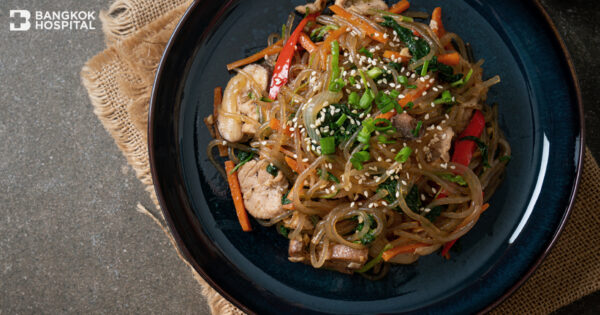Chronic kidney disease involves a gradual loss of kidney function. The kidneys filter wastes and excess fluids from the blood, which are then removed in the urine. Chronic kidney disease can lead to fluid retention and waste buildup in the body. Treatment for chronic kidney disease aims to slow the progression of kidney damage by controlling the cause that might vary among individuals. Besides different treatment approaches, diet modification plays an essential role in prolonging disease progression. In fact, special kidney-friendly diet helps to support kidneys and limit the work they must function.
The benefits of diet modification in patients with chronic kidney disease
A number of clinical studies indicate that an appropriate diet modification is beneficial to patients with chronic kidney disease. The benefits include:
- Prolong disease progression.
- Delay hemodialysis as a treatment for end-stage kidney disease.
- Reduce fluid and waste retention in the body which can be life-threatening.
- Prevent muscle wasting as a significant consequence of chronic kidney disease due to an increase in the rate of muscle protein degradation.
- Minimize the chance of malnutrition characterized by protein energy wasting and micronutrient deficiency.
- Preserve proper nutritional status.
- Improve overall health with a good quality of life.

Diet planning for patients with chronic kidney disease
Chronic kidney disease is divided into five stages, based on glomerular filtration rate indicating how well the kidneys function. Different stages of chronic kidney disease require different diet planning and restrictions. To prolong disease progression and prevent complications, it is important to pay more attention to these 6 diet groups:
-
Meat
- Meat contains protein that the body needs for optimal health. Protein derived from meat can cause less waste retention in the body compared to those obtained from plants.
- Overconsumption of protein results in an increased amount of waste which accelerates the kidney damage.
- Less consumption of protein also causes the loss of muscle mass while impairing immune function and increasing risk of death.
- Under close supervision of registered dietitian team, they will estimate how many grams of protein each patient needs each day and make recommendations based on dietary guidelines.
-
Rice and starches
- Rice and starches are a main source of energy in patients with chronic kidney disease. Sufficient amount of carbohydrate intake helps to prevent muscle wasting as a common comorbidity of chronic kidney disease.
- As rice and starches contain a wide range of protein amount, therefore patients with stage 3 – 5 kidney disease might face difficulty in controlling their protein intake. Nutrition advice on carbohydrate selection must be strictly followed. Low-protein starchesg. vermicelli noodles and tapioca pellets or sago are an ideal option to slow kidney damage.
-
Fats
- Unsaturated fats are the preferable choice (saturated fats are often found in lard and animal oil)
- Heart-healthy fats are, for example, olive oil, canola oil, rice bran oil and sunflower seed oil.
-
Fruits and vegetable
- Fruits and vegetables are a good source of minerals. In chronic kidney disease, impaired kidneys cannot fully maintain the balance of certain electrolytes and minerals. Eating of certain fruits and vegetables substantially helps to keep electrolyte balance which is beneficial to the treatment.
- The selection of fruits and vegetables depends on the current levels of potassium, magnesium, calcium and sodium in the blood.
- Consumption of certain fruits and vegetables can also help to avoid using diuretic drugs and delay hemodialysis treatment.
-
Salt
- Salt is a source of sodium.
- Excess salt intake leads to an increased sodium level in the blood, resulting in an elevated blood pressure and edema. The amount of sodium intake per day must be limited to less than 2,000 milligrams (equals to 1 teaspoon of salt). Lower the amount of sodium you eat each day by avoiding eating salt or sauces that contain more than 1,000 – 1,200 milligrams per day. Examples of 400 milligrams of sodium are ¼ teaspoon of salt, 1 teaspoon of fish sauce, 1 teaspoon of soy sauce, 1 tablespoon of oyster sauce and 2 tablespoons of tomato or chili sauce.
-
Water
- Patients with chronic kidney disease need to limit the fluid intake to prevent fluid retention, which could lead to swelling in the body, high blood pressure and pulmonary edema – excessive fluid in the lungs.
- The amount of fluid intake each day also refers to all fluid foods and beverages, e.g. water, soup, vegetable and fruit juices.
World Kidney Day is a global health awareness campaign focusing on the importance of the kidneys and reducing the frequency and impact of kidney disease and its associated health problems worldwide. It is observed annually on the 2nd Thursday of March. On this occasion, we would like to raise awareness towards kidney disease prevention by eating 5 food groups, avoiding high-sodium diet, drinking appropriate amount of water as recommended and exercising regularly while avoiding cigarette smoking. Annual health check-up that includes kidney function test is highly recommended. For patient with chronic kidney disease, it is important to follow all instructions advised by the nephrologist, allowing an effective treatment aiming at slowing disease progression and preventing other serious complications.
Reference:
Nutrition / Dietician team, Kidney Center, Bangkok Hospital.







